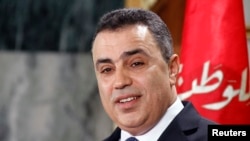PARIS —
Tunisia is beginning a fresh political chapter after lawmakers passed a new constitution late Sunday that some herald as a model for other Arab countries. A newly named caretaker government will be tasked to usher the country to elections.
Tunisia's airwaves were full of the news Monday morning - the North African country finally has a new constitution, more than three years after its revolution ousting long-time dictator Zine el Abidine Ben Ali. Tunisian Prime Minister Mehdi Jomaa has also named a new caretaker Cabinet. Lawmakers are expected to vote on the ministers later this week.
Cheers erupted in parliament late Sunday night, and lawmakers began singing the national anthem after the charter was adopted by 200 out of 216 votes, completing one of the last steps in establishing a democratic government.
Assembly speaker Mustapha Ben Jafaar spoke following the vote, in remarks broadcast by Al Jazeera.
"Of course nothing is perfect, but we strongly believe this constitution represents a good basis and enforces the necessary and balanced mechanisms that guarantee rights and freedoms," said Ben Jafaar.
The process has been long and sometimes bitter - especially on issues like women's rights and the role of religion. Last year, the assassination of two secular politicians plunged the country into a political crisis. But today, many hail the constitution as an example of compromise between secularists and the moderate Islamist Ennahda party.
Human rights groups have closely monitored the process. Despite some concerns regarding free speech language, Amira Yahyaoui of the rights group Al Bawala said the charter is “90 percent” good.
“For the first time, maybe, we will be able to say that democracy is not a western concept, but a universal concept. And this is by having the first Arab democratic country. Tunisia was the laboratory of the Arab Spring, and clearly it's the one and only country succeeding [when it comes to] real democracy in the Arab region,” said Yahyaoui.
The constitution bans torture, guarantees equal rights between men and women and the right to due process. While it names Islam as the country's religion, it also guarantees freedom of worship.
Another so-called 'Arab Spring' country, Egypt, passed its own constitution by referendum earlier this month. The vote in favor was overwhelming, partially because the government repressed any opposition.
“I hope this constitution and this process will give faith to Egyptian people to finish their revolution and give hope and faith to the rest of the Arab countries,” said Yahyaoui.
Tunisia's new constitution is supposed to pave the way for democratic elections later this year, but the caretaker government will face a tough road ahead. Major issues of the new government include tackling poverty and unemployment and dealing with the rise of militant Islam.
Tunisia's airwaves were full of the news Monday morning - the North African country finally has a new constitution, more than three years after its revolution ousting long-time dictator Zine el Abidine Ben Ali. Tunisian Prime Minister Mehdi Jomaa has also named a new caretaker Cabinet. Lawmakers are expected to vote on the ministers later this week.
Cheers erupted in parliament late Sunday night, and lawmakers began singing the national anthem after the charter was adopted by 200 out of 216 votes, completing one of the last steps in establishing a democratic government.
Assembly speaker Mustapha Ben Jafaar spoke following the vote, in remarks broadcast by Al Jazeera.
"Of course nothing is perfect, but we strongly believe this constitution represents a good basis and enforces the necessary and balanced mechanisms that guarantee rights and freedoms," said Ben Jafaar.
The process has been long and sometimes bitter - especially on issues like women's rights and the role of religion. Last year, the assassination of two secular politicians plunged the country into a political crisis. But today, many hail the constitution as an example of compromise between secularists and the moderate Islamist Ennahda party.
Human rights groups have closely monitored the process. Despite some concerns regarding free speech language, Amira Yahyaoui of the rights group Al Bawala said the charter is “90 percent” good.
“For the first time, maybe, we will be able to say that democracy is not a western concept, but a universal concept. And this is by having the first Arab democratic country. Tunisia was the laboratory of the Arab Spring, and clearly it's the one and only country succeeding [when it comes to] real democracy in the Arab region,” said Yahyaoui.
The constitution bans torture, guarantees equal rights between men and women and the right to due process. While it names Islam as the country's religion, it also guarantees freedom of worship.
Another so-called 'Arab Spring' country, Egypt, passed its own constitution by referendum earlier this month. The vote in favor was overwhelming, partially because the government repressed any opposition.
“I hope this constitution and this process will give faith to Egyptian people to finish their revolution and give hope and faith to the rest of the Arab countries,” said Yahyaoui.
Tunisia's new constitution is supposed to pave the way for democratic elections later this year, but the caretaker government will face a tough road ahead. Major issues of the new government include tackling poverty and unemployment and dealing with the rise of militant Islam.





